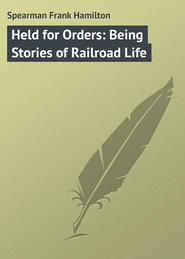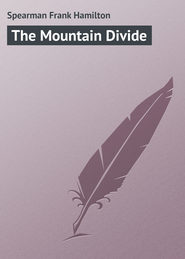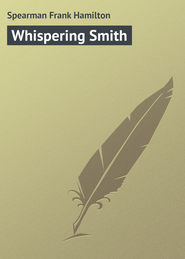По всем вопросам обращайтесь на: info@litportal.ru
(©) 2003-2024.
✖
Nan of Music Mountain
Автор
Год написания книги
2017
Настройки чтения
Размер шрифта
Высота строк
Поля
All eyes being turned their way, de Spain’s attention as well was drawn toward them. The man was powerful in stature, and rather too heavy, but straight as an Indian. His small, reddish face was tanned by the sun and wind, and his manner as he stood with arms akimbo, his hands resting on his belt, facing his partner and talking to her, had the confidence of a man at ease with women. From the handsome hat which, as he turned to his partner for the dance, he sent spinning toward a table beside the piano, the soft brown shirt and flowing tie, down to the small, high-heeled and spurred boots, he wore the distinctive cowboy rig of the mountains, even to the heavy hip-holster, in which his revolver was slung. He was, in fact, rather too smartly dressed, too confident in manner to please de Spain, who was in no mood to be pleased anyway, and who could conceive a dislike for a man the instant he set eyes on him–and a liking as quickly. He seemed to recall, too, that this particular fellow had crowed the loudest when he himself forfeited the shooting-match earlier in the day.
But de Spain, unamiable as he now was, looked with unconcealed interest at the man’s dancing partner. She, too, was browned by the mountain sun and air–a slight, erect girl, her head well set, and a delicate waist-line above a belted brown skirt, which just reached the tops of her small, high, tan riding-boots. She wore a soft, French-gray Stetson hat. Her dark-brown hair was deftly hidden under it, but troublesome ringlets strayed about her ears as if she had not seen a glass for hours, and these, standing first with one hand and then the other laid against her leather belt, she put up into place, and as if not wholly at ease with her surroundings. Instead of looking at her partner, who talked to her while waiting, her eyes, noticeably pretty, wandered about the platform, resting at moments on the closely drawn lines of spectators. They reflected in their unrest the dissatisfied expression of her face. A talkative woman standing just in front of de Spain, told a companion that the man was Gale Morgan, a nephew of Satterlee, laziest of the Morgans. De Spain, who never had to look twice at any woman, at once recognized in the dancing partner the little Music Mountain girl who had been his undoing at the target; the woman added that Nan was, in some hazy degree, Gale’s cousin.
The energetic piano thumped the strains of a two-step. Gale Morgan extended his arm toward Nan; she looked very slight at his side. But instead of taking her position, she drew back, looking up and frowning as she seemed to speak objectingly to Gale. De Spain saw her hesitation without catching its import. The talkative woman near at hand was more divining. “Lord, that Nan Morgan makes me tired,” she exclaimed to her gum-chewing companion, “ever see anything like her? First she wouldn’t dance unless the floor was cleared–Sleepy Cat folks ain’t good enough for them Music Mountain cattle thieves! And now the music doesn’t suit her. Listen to that boob of a boy trying one piece after another to get one to suit my outlaw lady. Nerve!”
But while the impatient woman chafed the right tune was found, and Nan Morgan’s face, as she watched the manipulator of the piano, brightened. “Faster!” she cried under her breath, taking her position on her cousin’s arm. Then, responding with a sort of fiery impatience to her partner’s guiding, she caught the rapid step of the music, and together the two swept down the floor.
Whatever the impatience of the crowd over the finicky start, the spectators soon showed their admiration of the dancing with unrestrained hand-clapping, and followed with approving outcries. De Spain, standing apart, watched Nan’s flying feet, wondering how she and her people could possibly be what they were painted, and whether they really were so or not. Every swaying step, every agile turn proved how sure she was of herself, and how perfectly her body answered to every exaction of the quick movement of the dance. Gale Morgan seemed the merest attendant for his partner, who, with quickened pulses, gave herself up more and more to the lively call of the music.
Once the two swung away out, near to de Spain’s corner. As Nan whirled by, de Spain, either with the infection of the music or from her nearness to him, caught his breath. His eyes riveted themselves on her flushed face as she passed–oblivious of his presence–and he recalled how in the morning she had handled her rifle in the same quick, sure way. De Spain could not dance at all; but no one could successfully accuse him of not knowing how to handle any sort of a gun. It was only now, as she came so very close to him for the first time since the mortification of the morning, and he saw the smoothness of her pink-brown cheeks, that he could ungrudgingly give her full credit for shooting him down. He forgave her, unasked, the humiliation she had put on him. He felt an impulse to go up to her–now that she had stopped dancing–and congratulate her honestly, instead of boorishly as he had done at the match, and to say, unreservedly, that she was the better shot–indeed, one of the best he had ever seen.
But while he thought all of this he did not stir a step. The two dancers at once disappeared, and a new and rougher party crowded out on the floor.
“Now, isn’t that a pretty bunch!” exclaimed the critical woman again. “That’s the Calabasas gang. Look at those four men with the red neckerchiefs. Sandusky, that big fellow, with the crooked jaw–Butch, they call him–and his jaw’s not half as crooked as Sandusky himself, either. He couldn’t lie in bed straight. And Harvey Logan, with his black hair plastered over his eyes. Why, for one drink those two fellows would turn loose on this crowd and kill half a dozen. And there’s two of Duke Morgan’s cowboys with them, boozing old Bull Page, and that squint-eyed Sassoon–he’s worse than the others, that fellow–a fine bunch to allow in this town.”
De Spain had excellent ears. He had heard of these Calabasas men–of Sandusky and of the little fellow, Logan. They had much more than a local reputation as outlaws; they were known from one end of the Superstition Range to the other as evil-doers of more than ordinary ruthlessness. De Spain, from force of habit, studied every detail of their make-up. Both showed more than traces of drink, and both securing partners joined rudely in the dancing. It had become second nature to de Spain to note even insignificant details concerning men, and he took an interest in and remarked how very low Logan carried his gun in front of his hip. Sandusky’s holster was slung higher and farther back on the side. Logan wore a tan shirt and khaki. Sandusky, coatless, was dressed in a white shirt, with a red tie, and wore a soiled, figured waistcoat fastened at the bottom by a cut-glass button.
The Sleepy Cat gossip commented on how much money these men had been spending all day. She wondered aloud, reckless apparently of consequences, who had been robbed, lately, to provide it. Her companion scolded her for stirring up talk that might make trouble; averred she didn’t believe half the stories she heard; asserted that these men lived quietly at Calabasas, minding their own affairs. “And they’re kind to poor folks, too.” “Sure,” grimaced the obdurate one, “with other people’s money.” De Spain had no difficulty in placing the two women. One was undoubtedly the wife of a railroad man, who hated the mountain outlaws, and the other was, with equal certainty, a town sympathizer with slandered men, and the two represented the two community elements in Sleepy Cat.
De Spain, discontented, turning again into Main Street, continued on toward the Thief River stage barn. He knew an old Scotch Medicine Bend barnman that worked there, a boyhood friend; but the man, McAlpin, was out. After looking the horses over and inspecting the wagons with a new but mild curiosity, awakened by Jeffries’s proposal, de Spain walked back toward the station. He had virtually decided not to take the job that Jeffries painted as so attractive, and resolved now to take the night train back to Medicine Bend. Medicine Bend was his home. He knew every man, woman, and child in the town. Before the tragic death of his father, his mother had lived there, and de Spain had grown up in the town and gone to school there. He was a railroad man, anyway–a modest trainmaster–and not eager for stage-line management.
The prospect of reducing the Sinks to a law-and-order basis at his own proper risk could not be alluring to the most aggressive of law-and-order men–and de Spain was not aggressive. Yet within a moment of his sensible decision he was to be hurried by a mere accident to an exactly contrary fate.
As he passed Grant Street again he encountered a party on horseback heading for the river bridge. Trotting their horses leisurely, they turned the corner directly in front of de Spain. There were five in the company. Three of the men were riding abreast and a little ahead. Of these, the middle horseman was a spare man of forty years, with a black military hat, and a frankly disreputable air. His face was drawn up into a one-sided smile, marked by a deep, vertical wrinkle running up, close to his nose, from the corner of his mouth almost to the inner corner of his eye. Satt Morgan’s smile was habitual and lessened his stern aspect. At his right rode his cousin, Duke Morgan, older, shorter, and stouter. His square, heavy-jawed, smooth-shaven face was lighted by hard, keen eyes, and finished by an uncompromising chin. Duke was the real head of the clan, of which there were numerous branches in the Superstition Mountains, all looking with friendliness or enmity to the Morgans of Morgan’s Gap.
The yellow-haired man riding on the left, with a red face and red-lidded, squinting eyes, was in stature something between the two Morgans, and about the age of the elder cousin. His shoulders slouched, and he showed none of the blood of his companions. But this man, David Sassoon, the Calabasas gambler, quondam cowboy, and chronic brawler, stood in some way close to the different Morgans, and was reputed to have got each of them, at different times, out of more than one troublesome affair, either by sheer force of arms, or through his resourceful cunning.
These men were followed by a younger man riding with a very young woman. De Spain knew none of the front-rank men, but he knew well Nan Morgan and her dancing partner.
They were talking together, and Nan seemed from her manner at odds with her companion. He appeared to be trying to laugh the situation off when he caught sight of de Spain pausing for them to pass. Gale’s face lighted as he set eyes on him, and he spoke quickly to Nan. De Spain could not at first hear his words, but he needed no ears to interpret his laugh and the expression on his face. Nan, persistently importuned, looked around. She saw de Spain, much closer, it would seem, than she had expected to see a man looking directly at her, and her eyes rested on him only a moment. The substance of her cousin’s words she apparently had not caught, and he repeated them in a louder voice: “There’s your handsome Medicine Bend gunman!”
Nan, glancing again toward de Spain, seemed aware that he heard. She looked away. De Spain tightened up with a rage. The blood rushed to his face, the sarcasm struck in. If the birthmark could have deepened with humiliation it would have done so at the instant of the cold inspection of the girl’s pretty eyes. But he cared less for Nan’s inspection, cold as it was, than for the jibe of her satisfied cousin. Not content, Gale, calling ahead to the others, invited their attention to the man on the street corner. De Spain felt minded to hurl an insult at them in a body. It would have been four to one–rather awkward odds even if they were mounted–and there was a woman. But he only stood still, returning their inspection as insolently as silence could. Each face was faithfully photographed and filed in his memory, and his steady gaze followed them until they rode down the hill and clattered jauntily out on the swaying suspension bridge that still crosses the Rat River at Grant Street, and connects the whole south country–the Spanish Sinks, the Thief River gold-fields, the saw-toothed Superstition Range, Morgan’s Gap, and Music Mountain with Sleepy Cat and the railroad.
De Spain, walking down Grant Street, watched the party disappear among the hills across the river. The encounter had stirred him. He already hated the Morgans, at least all except the blue-eyed girl, and she, it was not difficult to divine from her expression, was, at least, disdainful of her morning rival.
Reaching the station platform while still busy with his thoughts, de Spain encountered Jeffries and Lefever.
“When are you coming up to take my job, Henry?” demanded the superintendent without any parley.
“I am not coming up,” announced de Spain bluntly.
“Not coming up, eh? All right, we’ll find somebody that will come up,” retorted Jeffries. “John,” he added, “wire Medicine Bend to send Farrell Kennedy here in the morning to see me.”
“What’s the reason that fellow sticks so close to Medicine Bend?” demanded Jeffries, when Lefever joined him later in his office.
“Don’t ask me,” frowned Lefever perplexed. “Don’t ask me. Henry is odd in some ways. You can’t tell what’s going on inside that fellow’s head by looking at the outside of it.” Jeffries grunted coldly at this bit of wisdom. “I’ll tell you what I should think–if I had to think: Henry de Spain has never found out rightly who was responsible for the death of his father. He expects to do it, sometime; and he thinks sometime he’s going to find out right there in Medicine Bend.”
While they were talking the train was pulling out for Medicine Bend with de Spain on board.
It was a tedious ride, and de Spain was much too engaged with his thoughts to sleep. The Morgans were in his head, and he could not be rid of them. He recalled having been told that long ago some of these same Morgans lived on the Peace River above his father’s ranch. Every story he had ever heard of their wild lives, for they were men sudden in quarrel and reckless of sequel, came back to his mind. He wondered what sort of a young girl this could be who lived among them–who could live among them–and be what she seemed at a glance to be–a fawn among mountain-wolves.
It was late when he reached Medicine Bend, and raining–a dismal kind of a night. Instead of going to his room, just across the street from the station, he went up-stairs and sat down with the train-despatchers. After an hour of indecision, marked by alternative fits of making up and unmaking his mind, he went, instead of going to bed, into the telegraph-room, where black-haired Dick Grady sat at a key.
“How about the fight to-night at Sleepy Cat?” Grady asked at once.
“What fight?” demanded de Spain perfunctorily.
“The Calabasas gang got to going again up there to-night. They say one of the Morgans was in it. Some town, that Sleepy Cat, eh, Henry?”
“What Morgan was in it?”
“Gale Morgan. A lot of stuff came in on it an hour ago. Was there anything started when you left?”
“I didn’t hear of anything,” responded de Spain. But his indifference to the subject was marked.
“What’s the matter?” demanded the operator. “Aren’t you well to-night?”
“Perfectly.”
“Sleepy?”
De Spain roused himself. “Dick, have you got a Sleepy Cat wire open?”
“What do you want?”
“Tell Jeffries I’ll take that Thief River stage job.”
CHAPTER III
THE SPANISH SINKS
From a car window at Sleepy Cat may be seen, stretching far down into the southwest a chain of towering peaks, usually snow-clad, that dominate the desert in every direction for almost a hundred miles. In two extended groups, separated by a narrow but well-defined break, they constitute a magnificent rampart, named by Spaniards the Superstition Mountains, and they stretch beyond the horizon to the south, along the vast depression known locally as the Spanish Sinks. The break on the eastern side of the chain comes about twenty miles southwest of Sleepy Cat, and is marked on the north by the most striking, and in some respects most majestic peak in the range–Music Mountain; the break itself has taken the name of its earliest white settlers, and is called Morgan’s Gap. No railroad has ever yet penetrated this southern country, despite the fact that rich mines have been opened along these mountains, and are still being opened; but it lies to-day in much of the condition of primitive savagery, and lawlessness, as the word is conventionally accepted, that obtained when the first rush was made for the Thief River gold-fields.
It is not to be understood that law is an unknown equation between Calabasas and Thief River, or even between Calabasas and Sleepy Cat. But as statute law it suffers so many infractions as to be hardly recognizable in the ordinary sense. Business is done in this country; but business must halt everywhere with its means of communication, and in the Music Mountain country it still rests on the facilities of a stage line. The stage line is a big and vigorous affair, a perfectly organized railroad adjunct with the best horses, the best wagons, the best freighting outfits that money can supply.
But this is by no means, in its civilizing effect, a railroad. A railroad drives lawlessness before it–the Music Mountain country still leans on stage-line law. The bullion wagons still travel the difficult roads. They look for safety to their armed horsemen; the four and six horse stages look to the armed guard, the wayfarer must look to his horse–and it should be a good one; the mountain rancher to his rifle, the cattle thief to the moonless night, the bandit to his wits, the gunman to his holster: these include practically all of the people that travel the Spanish Sinks, except the Morgans and the Mormons. The Mormons looked to the Morgans for safety; the Morgans to themselves.
For many a year the Morgans have been almost overlords of the Music Mountain country. They own, or have laid claim to, an extended territory in the mountains, a Spanish grant. One of the first mountain Morgans married a Spanish girl, and during the early days, when the Morgans were not fighting some one out of court, they were fighting some one in court on their endless and involved titles.
But whether they won domain in lawsuit or lost it, one pearl of their holdings they never submitted to the jurisdiction of any tribunal other than their own arms. Morgan’s Gap opens south of Music Mountain, less than ten miles west of Calabasas. It is a narrow valley where valleys are more precious than water–for the mountain valley means water–and this in a country where water is much more precious than life. And some of the best of this land at the foot of Music Mountain was the maternal inheritance of Nan Morgan.
At Calabasas the Thief River stage line maintains completely equipped relay barns. They are over twenty miles from Sleepy Cat, but nearly fifty the other way from Thief River. The unequal division is not due to what was desirable when the route was laid out, but to the limit of what man could do in the never-conquered desert. This supplies at Calabasas a spring, to tempt the unwary traveller still farther within its clutches. A large number of horses are kept at Calabasas, and the barn crews are quartered there in a company barrack. Along the low ridges and in the shallow depressions about Calabasas Spring there are a very few widely separated shacks, once built by freighters and occupied by squatter outlaws to be within reach of water. This gives the vicinity something of the appearance of a poorly sustained prairie-dog town. And except these shacks, there is nothing between Calabasas, Thief River, and the mountains except sunshine and alkali. I say nothing, meaning especially nothing, in the way of a human habitation.
But there is a queer inn at Calabasas. A pioneer Thief River prospector, mad with thirst, fought his way across the Sinks to the Calabasas Spring, and wandered thence one day into Sleepy Cat. In a delirium of gratitude he ordered built at Calabasas what he termed a hotel, to provide at that forbidden oasis for the luxurious comfort of future thirst-mad wanderers. It was built of lumber hauled a thousand miles, and equipped with luxuries brought three thousand–a fearsome, rambling structure, big enough for all the prospectors in the Rocky Mountains.
Having built this monument, creditable to his good-will rather than his good sense, the unfortunate man went really mad, and had the sorry distinction of being the first person to be put in the insane asylum at Bear Dance. It had never occurred to him that any one had any title to, or that any madder man would lay any claim to, so accursed a spot as Calabasas. But old Duke Morgan announced in due time that the hotel was built on Morgan land, and belonged to the Morgans. Nobody outside a madhouse could be found to dispute with Duke Morgan a title to land within ten miles of Morgan’s Gap, and none but a lunatic would attempt to run a hotel at Calabasas, anyway. However, a solution of the difficulty was found: Duke’s colorable title gave the cue to his retainers in the Gap, and in time they carted away piecemeal most of the main building, leaving for years the kitchen and the servants’ quarters adjoining it to owls, lizards, scorpions, and spiders.
Meantime, to tap the fast-developing gold-fields, the freight route and stages had been put in, and the barns built at Calabasas. A need naturally developed for at least one feature of a hotel–a barroom. A newer lunatic answered the call of civilization–a man only mildly insane stocked the kitchen range with liquors, and fitted up in a crude way the ice-boxes–where there never was ice–serving pantries, and other odd nooks for sleeping quarters. Here the thirsty stage passenger, little suspecting the origin of the facilities offered him for a drink, may choose strong drink instead of water–or rather, he is restricted to strong drink where water might once have been had–the spring being piped now half a mile to the barns for the horses. And this shack, as it is locally called, run by a Mexican, is still the inn at Calabasas. And it continues to contribute, through its stirring annals, to the tragic history of the continental divide.










